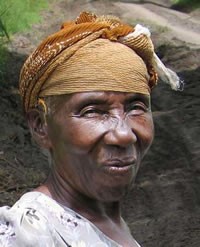Rufiji in Tanzania

Photo Source:
Link Up Africa
|
Send Joshua Project a map of this people group.
|
| People Name: | Rufiji |
| Country: | Tanzania |
| 10/40 Window: | No |
| Population: | 657,000 |
| World Population: | 657,000 |
| Primary Language: | Rufiji |
| Primary Religion: | Islam |
| Christian Adherents: | 9.00 % |
| Evangelicals: | 1.50 % |
| Scripture: | Unspecified |
| Ministry Resources: | No |
| Jesus Film: | No |
| Audio Recordings: | Yes |
| People Cluster: | Bantu, Central-Tanzania |
| Affinity Bloc: | Sub-Saharan Peoples |
| Progress Level: |
|
Introduction / History
The Rufiji people group live along the banks of the Rufiji River in Tanzania. Their homeland is largely rural but the heaviest population is clustered around a number of towns on the Dar es Salaam – Lindi main road.
What Are Their Lives Like?
The majority of the Rufiji are subsistence farmers. Many have farms some distance from their family homes in order to take advantage of occasionally flooded alluvial soils. This creates family separation for up to four months as the crops are sown and harvested. The primary crops grown are cassava, maize, rice, millet, sesame, coconut and cashew nuts.
Mangoes, oranges, pineapples, papaya and jackfruit are a major part of their diet. Some individuals are involved in fishing with others making and selling furniture while several are engaged in small-scale commercial ventures.
Each village has at least one primary school with standard grades 1 to 7. Regional secondary schools are available with a post-primary polytechnic school located in Ikwirri. Health services are provided at clinics located within 3 to 5 miles of the majroity of the people.
Rufiji houses are simple. Some are constructed with walls made from mud and wooden poles and thatched or corrugated roofs. Others, primarily in towns, are conventional homes built with concrete blocks. In the fertile and often flooded valleys along the Rufiji, traditional shelters on stilts are built to deal with the floodwaters.
What Are Their Beliefs?
Though Romanians are Orthodox Christians, they have maintained a number of superstitions regarding black cats, etc. In this worldview, events are determined by something other than God. There are also small populations of Roman Catholics and Evangelicals.
What Are Their Needs?
Romanians need a country with a strong economy. When parents have to migrate elsewhere to find work, the children suffer.
Prayer Points
Pray for the Lord to open Rufiji hearts through dreams and visions.
Ask the Lord to lay a burden on the hearts of individuals, local churches, national church organizations and mission groups for the off-the-main-road Muslim Rufiji. May this recognition of spiritual need result in on-site research for the purpose of developing relational bridges and identifying felt needs through which the gospel can be presented.
Believe the Lord to touch the hearts of Christian school teachers, dispensary workers and government personnel living among the Rufiji to recognize that they are strategically placed by God to be cross cultural missionaries. May they catch a vision of demonstrating the love of God and providing a living witness to those among whom they live. May their efforts result in conversions, discipleship and expanding house churches.